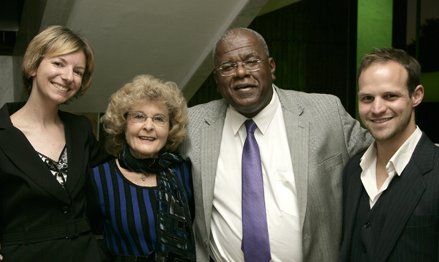Latest News Archive
Please select Category, Year, and then Month to display items
26 July 2022
|
Story Bulelwa Moikwatlhai
|
Photo Supplied
 Experiencing the UFS in person for the first time are from the left: Sandor Potjer (VU Amsterdam), Bulelwa Moikwatlhai (UFS OIA), Ricarda Kochems (Bremen University, Germany), Froukje Pronk (VU Amsterdam) and Matome Mokoena (UFS OIA)
Experiencing the UFS in person for the first time are from the left: Sandor Potjer (VU Amsterdam), Bulelwa Moikwatlhai (UFS OIA), Ricarda Kochems (Bremen University, Germany), Froukje Pronk (VU Amsterdam) and Matome Mokoena (UFS OIA)
As the UFS COVID-19 Regulations and Required Vaccination Policy has been lifted with immediate effect – allowing 100% capacity of both students and staff members and a fully operational campus – the
Office for International Affairs welcomes its first physical exchange cohort after two years. The cohort of students hail from the various international partners of the UFS, namely the
University of Bremen in Germany, the Vrije Universiteit Amsterdam, and Sciences PO Bordeaux in France. The students will be hosted in the UFS faculties of the Humanities, Economic and Management Sciences, and Natural and Agricultural Sciences, respectively.
These students have been paired with
Umoja Buddy Programme ambassadors to help ensure their smooth transition and integration into student life at the UFS. Furthermore, the students received an invitation from the President of the
International Student Association (ISA), Courtney Madziwa, to join their association, thus exposing them to students from other countries to learn about the various cultures.
On 18 July, the Office for International Affairs (OIA) arranged a hybrid orientation programme for the exchange students, including those students who have not yet arrived on the Bloemfontein Campus. The students took part in an icebreaker activity, where they had the opportunity to learn from and teach other participants about their home countries. Dr Cornelius Hagenmeier, Director of the OIA, welcomed the exchange students to the Bloemfontein Campus, and expressed excitement to have physical exchanges again. Furthermore, the guest presenters ranged from student leadership, staff members, and service providers.
The presentations were practical, demonstrating, among others, how to create a password on the institutional website – presented by Mr Molemo Mohapi from UFS ICT. The presentation on how to fully utilise Blackboard was facilitated by Ms Vuthihi Mudau from the UFS CTL division. We take the safety of all our students seriously, so Ms Elise Oberholzer from the UFS Protection Services has given the students some tips on how to safeguard themselves.
'England, the English and the problem of education in South Africa.’
2013-09-26
|
 |
Attending the lecture were, from the left: Dr Susan Brokensha, Senior Lecturer: Department of English; Prof Rosemary Gray, Professor Emeritus (Honorary Life Vice-President of the English Academy of Southern Africa); Prof Jonathan Jansen; and Dr Thinus Conradie, Lecturer: Department of English.
Photo: Johan Roux
26 September 2013 |
Prof Jonathan Jansen: Lecture
The university celebrated the life of one of South Africa's most renowned art critics, hosting the 2013 English Academy’s Percy Baneshik Memorial Lecture on the Bloemfontein Campus.
The keynote lecture was delivered by Prof Jonathan Jansen, Vice-Chancellor and Rector, who joined a distinguished list of speakers to have delivered the lecture. Presented annually by the English Academy of Southern Africa, an association dedicated to promoting the effective use of English as a dynamic language in Southern Africa, past speakers include Prof Es’kia Mphahlele, Prof Njabulo Ndebele, Dr Alan Paton and Prof Albie Sachs. The lecture is hosted at venues across the country and this year Bloemfontein paid tribute to Percy Baneshik.
In his speech Not even colonial born: England, the English and the problem of education in South Africa,' Prof Jansen addressed the dilemma of the politics of language in both school and university education today.
Talking about the dominance of English in schools, Prof Jansen said it is the language of choice because indigenous languages are so poorly taught. "Simply learning in your mother tongue is absolutely no guarantee of improved learning gains in school. The problem is not the language of instruction; it is the quality of teaching, the knowledge of curriculum and the stability of the school."
Prof Jansen told the audience in the CR Swart Hall that Afrikaans-exclusive, or even Afrikaans-dominant white schools represent a serious threat to race relations in South Africa. "You simply cannot prepare young people for dealing with the scars of our violent past without creating optimal opportunities in the educational environment for living and learning together."